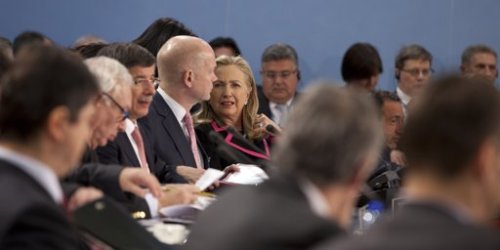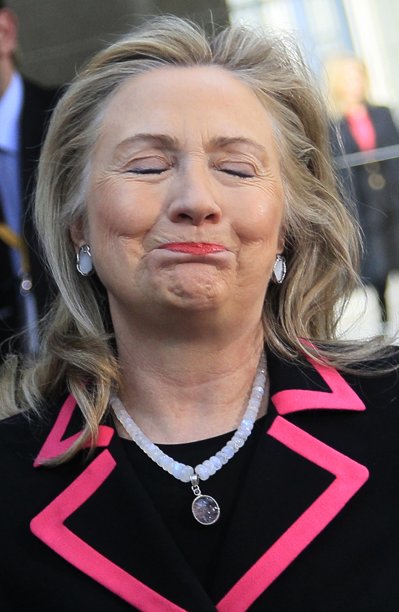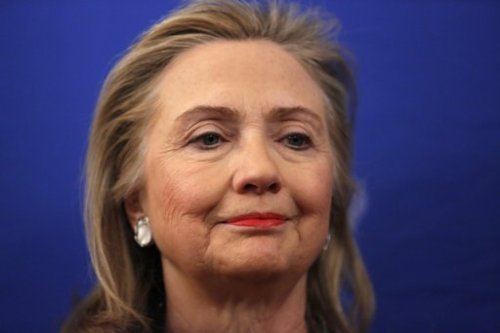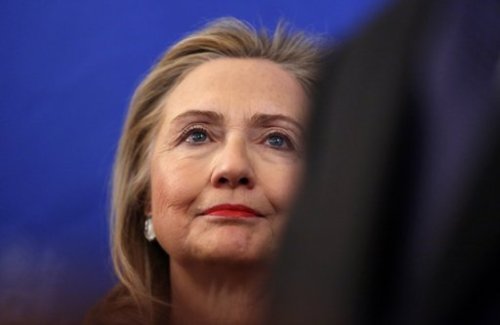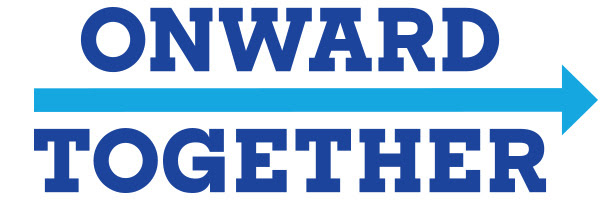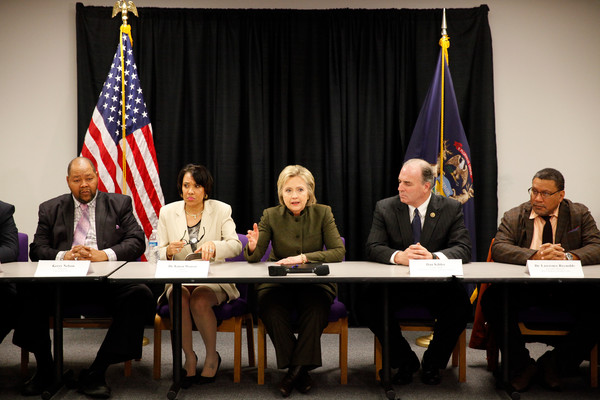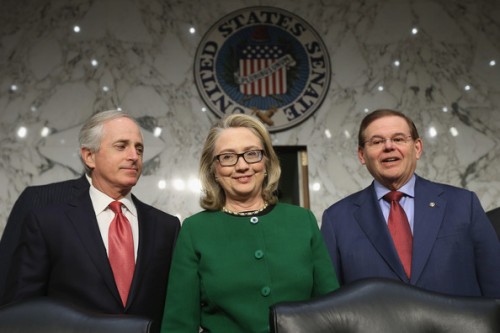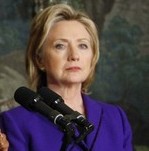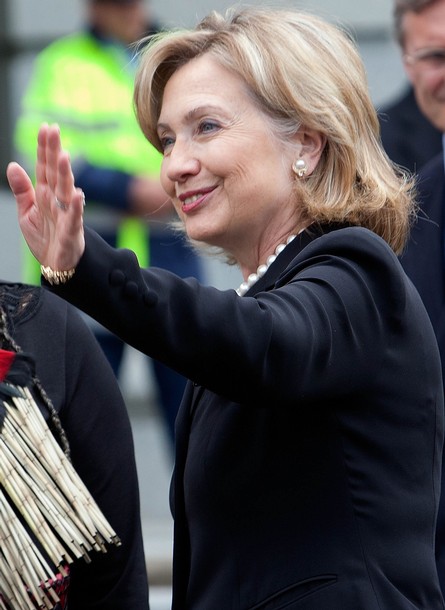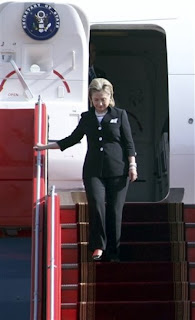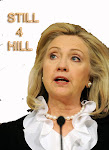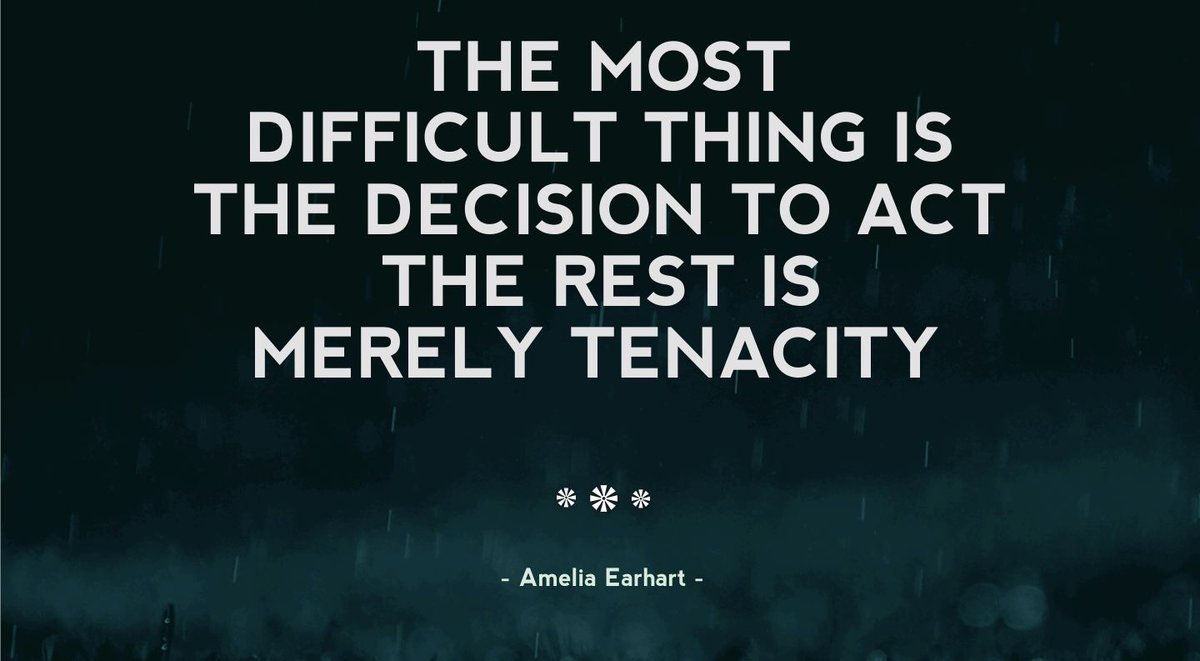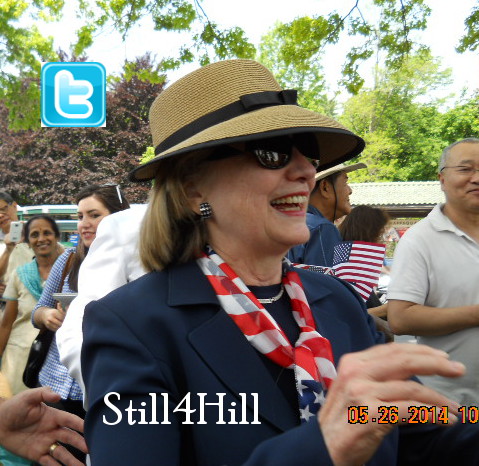Thank you. (Applause.) Thank you very much. It’s wonderful to be back at Brookings. It’s always a joy to be introduced by such a longtime friend and colleague as Strobe Talbott and to have this opportunity to discuss with you how we have, over the last four years, revitalized our transatlantic alliance. I also want to recognize and thank members of the diplomatic corps who are here.
There is no better venue for my remarks than here at Brookings. Through the Center on the United States and Europe and initiatives like the Daimler Forum on Global Issues, Brookings provides an essential forum for examining how the United States and Europe can work together to meet the challenges of a rapidly changing world. After all, in the democracies of Europe, we find countries with shared strategic and economic interests and with whom we share a long history, deep cultural ties, and cherished values. That makes us natural partners in advancing our interests, both within Europe and throughout the world.
But I must begin by being very frank. When President Obama and I came into office, this relationship was frayed. There were skeptics and doubters on both sides of the Atlantic. Europeans were asking hard questions about what the transatlantic partnership could deliver for them and whether it was even still relevant in the 21st century. And many Americans were asking the same questions.
At the same time, at the start of the Administration, we faced some rather daunting global challenges, among the most difficult in decades: a global economic downturn, an aggressive regime with nuclear ambitions in Iran, two unfinished wars, uncertainty about America’s global leadership and staying power. From day one, President Obama and I made clear that if we were going to make progress, we had to do the hard work of renewing and reinvigorating our partnerships around the world, and that began with Europe.
We knew it couldn’t happen overnight. As then-Senator Obama said in Berlin in 2008, “True partnership and true progress requires constant work and sustained sacrifice. They require the burdens of development and diplomacy, of progress and peace. They require allies who will listen to each other, learn from each other, and, most of all, trust each other.” Four years later, we are showing that this partnership can deliver results for all our people.
Next week, I will make my 38th visit to Europe as Secretary. Visits to other parts of the world often get more attention, because I think it’s kind of taken for granted in a way that we’re going to be going back and forth across the Atlantic. But indeed, 38 visits to Europe is something that I have been delighted to do because of the importance we place on these relationships.
In Prague, I will see senior officials to discuss our efforts to promote Czech energy independence and to advance human rights and democracy. In Brussels, I’ll meet with NATO allies to talk about the broad range of security challenges we face. I’ll meet with EU counterparts to discuss the future of energy security. In Dublin, I’ll join my colleagues from the OSCE to renew and review our progress in advancing security, democracy, and human rights across Europe and Eurasia. And in Belfast, I’ll meet leaders and citizens to reiterate America’s commitment to a peaceful, prosperous Northern Ireland. It is a full schedule, but it demonstrates the commitment we’ve brought to our transatlantic partnership.
Today, I’d like to discuss briefly how these efforts have helped the United States and Europe meet a number of key security challenges: the war in Afghanistan, the crisis in Libya, Iran’s nuclear program, and strengthening our strategic defenses. At the same time, our transatlantic partnership has arrived at a critical moment. Decisions we’ll soon face about our shared economic interests will determine how well we can thrive together in the years to come. So I want to describe the work that lies ahead of us as well.
But first, let me review what I think we’ve accomplished in the past few years because I think it speaks volumes of the value and importance we’ve placed on the relationship. We began by working to improve the lines of communication that had become strained. See how diplomatic I’ve become? (Laughter.) American and European diplomats have come together thousands of times in the past four years to discuss issues both familiar and new, from security to trade to clean energy. It may not be glamorous work, but it is the hard daily work, the necessary work, of rebuilding the mutual trust and confidence on which our partnership depends.
Ultimately, our goal was to face, head on, the issues that had driven a wedge between us and get back on the path of cooperation. Consider Afghanistan. For close to a decade, tens of thousands of European troops have served alongside American service members in the largest and longest overseas deployment NATO has ever undertaken. At the same time, many thousands of European diplomats and development experts served with ours as well. But four years ago, support for this effort was fading. Strained budgets were making some governments look twice at the cost of the commitment. Many in America worried that the United States would be left to bear the burden on its own and doubted that our alliance would stay the course.
Instead, we came together with our allies and charted a common path forward. It started in Brussels in 2009, when we agreed that getting the job done would take a stronger military presence on the ground. The next year, in the summit in Lisbon, we agreed on a timetable for transitioning security responsibilities to the Afghans by the end of 2014. Earlier this year at the summit in Chicago, we reaffirmed the core principle of “in together, out together,” and made commitments on financing, supporting, and training Afghan security forces beyond 2014. In Tokyo last summer, we pledged ongoing economic and civilian support for the Afghan people following the transition.
And together, we are helping the Afghans take back their country and secure their future. Al-Qaida’s core leadership has been decimated there. Three-quarters of the population now live in areas where Afghan forces have taken over lead responsibility for security, and conflict has moved farther away from population centers.
Now, believe me, we know there is an enormous amount of hard work ahead, and success, however one defines it, is far from guaranteed. But we worked past our differences; we kept our eyes on the most important goal, helping the Afghan people lay the foundation for their own progress and better futures for themselves.
Even as we shored up support for a decade-long conflict in Afghanistan, we also showed that the Alliance can answer the challenges of today. When the Libyan people demanded their freedom and Qadhafi threatened to hunt down the people of Benghazi like rats, we responded. And we all shared the burden. Early on, the United States knocked out Libya’s integrated air defenses, and later we provided other crucial assets. Our European and Canadian allies policed the skies, carried out the bulk of air strikes, provided logistical support, and enforced the arms embargo at sea.
Think for a moment about the NATO action in Kosovo in the 1990s. In that mission, the United States dropped nearly 90 percent of the precision guided munitions, compared to our allies’ 10 percent; in Libya, it was the other way around.
Now, Libya was not a flawless operation. European air forces were severely stressed, and we are concerned about further defense cuts by our allies that could impede our ability to undertake necessary defense and such operations in the future. But Operation Unified Protector showed that NATO still has a critical role to play in advancing our common security interests. And we’re taking advantage of the lessons we learned to make the Alliance more effective.
Beyond NATO, there may be no better example of our cooperation than the way we are holding the Iranian Government accountable for its illicit nuclear program. Few would argue that Iran’s nuclear ambitions are anything less than a grave threat to its neighbors and the world. But four years ago, during a serious economic slowdown, the conventional wisdom said that the EU had no appetite for deploying the most powerful diplomatic tool we had to put pressure on the regime, a total embargo of Iranian oil.
Well, we set out to prove the conventional wisdom wrong. We built a strong coalition of nations, persuaded other oil suppliers to step up production, and created the space that the EU needed to put a boycott in place. We coupled that action with unprecedented global sanctions and some creative solutions that are making it harder for companies to do business with Iran: going after Iran’s central bank; working with insurers, shippers and oil companies to keep Iran’s oil resources bottled up inside their own borders. As a result, Iran’s oil production is down a million barrels a day. That costs the Iranian government $3 billion every month.
The United States, as President Obama has said repeatedly, is determined to prevent Iran from acquiring a nuclear weapon. I think we have also shown that diplomacy is our preferred approach. But the window for Iran to negotiate seriously is not open indefinitely. Through the E3+3 process and multilateral fora like the IAEA, the United States and European leaders are pushing Tehran to live up to its international obligations and abandon its pursuit of nuclear weapons.
We’re also modernizing our defensive capabilities across Europe to guard against 21st century threats. We’re maintaining our largest permanent military presence outside the United States there, while at the same time updating our ballistic missile defense to protect against threats from outside the continent. These new technologies are helping protect potential targets in both Europe and America. We’ve already deployed a critical radar in Turkey, and agreed to home-port Aegis missile defense cruisers in Spain. And in the coming years, new interceptor systems and their American operators will be deployed in Romania and Poland, enhancing our defensive capabilities for years to come.
So on a wide range of global security issues we are more closely aligned with our European partners than we’ve ever been.
Now, of course, Europe and the United States are never going to agree on every issue, just as Europeans will not always agree among themselves. Just today, in fact, a number of EU member states are likely to take a different position from us on a measure at the UN General Assembly granting observer-state status to the Palestinian Authority. The United States opposes the resolution, which we believe will do nothing to advance the peace and the two-state solution we all want to see. At the same time, however, we and our European partners agree on the most fundamental issues and share a common objective: two states living side by side in peace and security.
We can all also agree that we are better off working together on this issue, just as on the others that I have mentioned. Imagine what the world would look like if we did not. A Libyan dictator, left to his own devices, slaughtering his own people. A safe haven for terrorists in Afghanistan. Iran leveraging its oil supply to underwrite a nuclear weapons program. That is not a world in which Americans or Europeans or anyone else would be better off.
So what we have achieved in the last four years is a record we must keep building on, because there are even more consequential and in many ways more difficult challenges that lie ahead.
For example, we look to our longtime European allies to help improve security and build new economic relationships in Asia. And let me be clear: Our pivot to Asia is not a pivot away from Europe. On the contrary, we want Europe to engage more in Asia, along with us to see the region not only as a market, but as a focus of common strategic engagement.
Another ongoing challenge we need to deal with together is Russia. We’ve made progress with Moscow on areas such as nuclear arms reduction, sanctions on Iran, and trade, and we seek to expand our areas of cooperation. But the reality is that we have serious and continuing differences on Syria, missile defense, NATO enlargement, human rights, and other issues. It will be up to us and our European partners to continue looking for opportunities to engage with Russia and to make progress on the issues that matter to us.
There are so many other areas that are ripe for cooperation, from supporting the transitions in North Africa and the Middle East, to responding to climate change, to relieving famine in the Horn of Africa, to managing relationships with emerging powers. But if the United States and Europe are not strong, stable, and prosperous in the long-term, our ability to tackle these and other issues will be put at risk. If we can’t make the necessary investments in defense, diplomacy, and development, our partnership might not bear the weight of these 21st century challenges.
So while we build on our recent successes, we also need to remain focused on areas where our partnership still has work to do. Perhaps the most important question in the years ahead will be whether we invest as much energy into our economic relationship as we have put into our security relationship. At a time when countries are measuring their influence as much by the size of their economies as by the might of their militaries, we have to realize the untapped potential of the transatlantic market. This is as much a strategic imperative as an economic one.
After all, so many of the things we do around the world depend on our economic strength – from providing defense, to investing in emerging markets, to aiding development, to responding to crises. And there may be no greater threat to our security and our transatlantic partnership than a weak economic future on one or both sides of the Atlantic. If we’re serious about strengthening our economic ties, we each need to build stronger foundations at home. For the United States, this means making tough political choices. It means investing in our own competitiveness to set the platform for stronger economic growth. And it means addressing our domestic fiscal challenges.
As you know, Washington is gearing up for another round of budget negotiations. And I am again hearing concerns about the global implications of America’s economic choices. And although I am now out of politics, let me assure you that for all the differences between our political parties here, we are united in our commitment to protect American leadership and bolster our national security. Reaching a meaningful budget deal is critical to both. This is a moment, once again, to prove the resilience of our economic system and reaffirm American leadership in the world.
And we are counting on Europe to do the same. First and foremost, that means resolving the Eurozone crisis. And we’ve seen some good progress recently. Over the summer, the European Central Bank announced that it would stand behind governments that are implementing critical reforms, which has effectively reduced borrowing costs for these countries. And a few weeks ago, Greece took an important step by passing a budget and reform package that makes tough trade-offs. And just this week, European governments and the IMF agreed on measures to reduce Greece’s debt burden.
Ireland and Portugal have implemented sweeping reforms that should improve their competitiveness. Spain and Italy are also on the path to reform and eventual recovery. This has not, of course, been easy, but after two years of vigorous debate and a dozen elections, the 17 governments of the Euro area remain united in their will to maintain Europe’s monetary union. Time and again, skeptical governments and crisis-weary voters have chosen to keep the Eurozone intact and to keep trying to resolve the crisis.
Now, we recognize that this is fundamentally a European problem that requires European solutions. America can’t and shouldn’t try to dictate any answer or approach. But even as the risks of financial crisis recede, I want to urge European leaders to keep working to address the challenge of economic growth and jobs. The Eurozone economy is slipping back into recession as austerity policies take effect. France and Germany, which have largely weathered the economic storm so far, are also beginning to show some signs of slowdown.
So it’s vital to the entire global economy that European leaders move toward policies that promote credible and sustainable growth and create jobs. But even as we’re making these tough choices on our own, there’s a great deal more on the economic front we can and must be doing together. Like tackling global imbalances, which are creating a drag on the recoveries in both America and Europe, and perhaps more importantly, working to strengthen our transatlantic trade relationship.
Now of course, Europe is already America’s largest trade and investment partner. And we have made some progress building on that. We have revitalized the Transatlantic Economic Council and set up the U.S.-EU Energy Council. We’ve broken down regulatory barriers and are working to establish standards, common standards, for manufacturing, and our collaboration with the private sector is starting to show results in developing smart grids and other new energy technologies.
But despite that progress, the United States remains one of only a handful of WTO members not to move beyond Most-Favored-Nation status with the EU. We need to do better. In the face of rising challenges to our shared economic model, and the growth of barriers to trade that have emerged not at borders but behind them, we need to continue to promote a rules-based order of open, free, transparent, and fair competition in the global marketplace.
That’s why we are discussing possible negotiations with the European Union for a comprehensive agreement that would increase trade and spur growth on both sides of the Atlantic. We have more work to do, including addressing longstanding barriers to trade and market access. But if we work at it and if we get this right, an agreement that opens markets and liberalizes trade would shore up our global competitiveness for the next century, creating jobs and generating hundreds of billions of dollars for our economies. So I hope we will continue working to find a way forward, and make stronger trade and investment ties a major strategic goal of our transatlantic alliance.
Now, the path ahead for Europe and for our partnership will not be an easy one, but I’m confident that we will, once again, do what is necessary because we have done it so many times before. We united to rebuild a continent devastated by war. We built NATO to protect a continent threatened by Soviet domination. And we’re continuing to work together on the unfinished work inside Europe, like European enlargement and integration, which the United States has championed for decades.
We are looking forward to Croatia’s accession to the EU next year. Last month, as Strobe said, I traveled to the Western Balkans with High Representative Ashton, where we expressed our support for the aspirations of the people there to be integrated into Europe and the Euro-Atlantic Alliance. We support the dialogue between Kosovo and Serbia that is taking place under the good offices of the EU. And we hope to see movement toward normalizing relations.
And let me add what a pleasure it has been working with Cathy Ashton. Not only is she a great diplomat and a personal friend, but it is exciting to see the EU becoming a more cohesive voice in world affairs.
We also must continue advancing the work of democracy and human rights in those parts of Europe and Eurasia that are not yet where they need to be. Ukraine’s October elections were a step backwards for democracy, and we remain deeply concerned about the selective prosecution of opposition leaders. In Belarus, the government continues to systematically repress human rights, so we must continue to push for the release of political prisoners and support those brave activists standing up for the rights of the people of Belarus. We welcomed Georgia’s elections and the first peaceful transition in that country’s history, and we continue to call on Georgia’s new government to demonstrate its commitment to democracy, transparency, due process, and the rule of law. From Eastern Europe to the Balkans to the Caucasus, the United States and the EU must continue to assist civil society, support democratic reforms, and promote tolerance throughout and within societies.
In short, we are advancing the values and principles that have underpinned our partnership for so long. And even in the moments when the United States and Europe could agree on little else, that foundation remained steadfast. In this sense, the last four years represent not a new direction, but a return to form, and a reminder of what the United States and Europe stand for: That commitment to freedom and democracy, that dedication to human rights and opportunity for all, the conviction that progress depends on our willingness to see past our differences.
There’s an old saying: “If you want to go fast, go alone. If you want to go far, go together.” And over the past four years – and for decades before that – the United States and Europe have come far, together. Now we’re called to take on two tasks at once: to continue the work of advancing our shared interests and values around the world, even as we shore up the sources of our strengths at home.
If we work together, I’m confident that the United States and Europe are up to the challenge, that our partnership will not only endure but it will thrive and grow stronger, and that we will carry forward the work of every generation of Europeans and Americans alike – to build a more just, more prosperous, more peaceful, free world. That is an extraordinary mission, and it’s a privilege to be part of trying to move it forward.
Thank you all very much.




















































